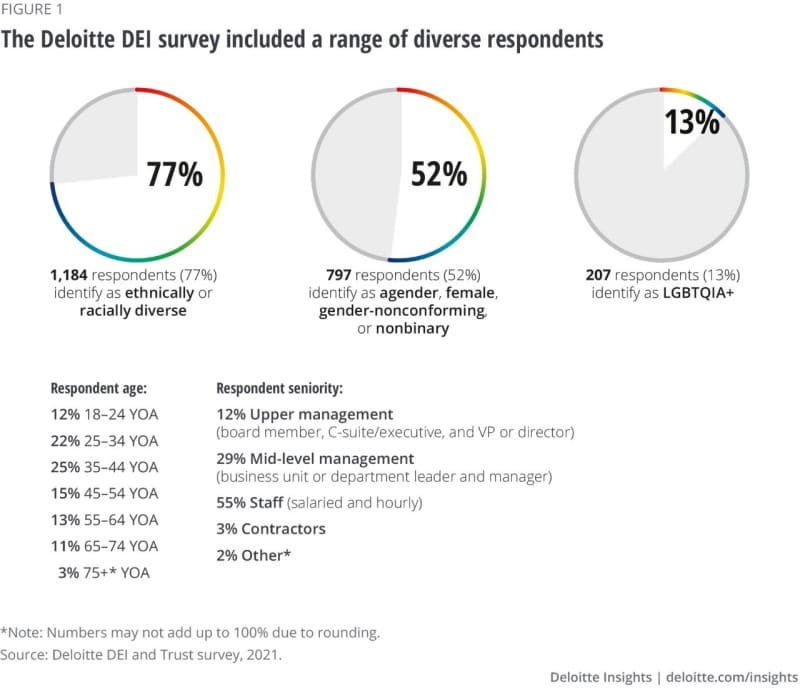Since the spring of 2020, many organizations have made public commitments to address societal disparity and injustice, and established or expanded diversity, equity, and inclusion (DEI) initiatives for their current and future workforce. After more than a year of accelerated efforts, the questions arise: Do workers trust their organizations’ commitment and efforts thus far? And how might this change going forward?
Trust can be a critical factor in the relationship between a worker’s performance and operational success. Prior research indicates that if employees cannot trust their employers to fulfill the commitments they have made, their levels of engagement could decrease, and they might become more likely to withhold their best efforts.1 Alternatively, if employees trust their employer’s commitments, their engagement level can increase up to 20%, and the likelihood they will leave their organization decreases by 87%.2 Additionally, amid the “Great Resignation,”3 there have been notable shifts in workers’ feelings about the role of work in their lives4 and increasing expectations that employers share and reflect their workers’ values, including commitments to DEI.5
To understand whether organizational DEI commitments and efforts are improving workers’ trust in their organizations, we surveyed 1,543 workers, mainly respondents who identified as Black, Hispanic/Latinx, Asian, female, and LGBTQIA+. This research looks at these questions from the worker’s perspective, providing insights into how much workers currently trust their organizations’ DEI efforts—their commitment, objectives, and progress—and examines the implications for organizations as they plan their DEI strategies.
What we’ve found in our research is encouraging. Workers, including those who, as part of our survey demographic questions, self-identified as members of diverse populations, currently trust their employers’ DEI efforts. But our research also shows that it would be a mistake to take this trust for granted, and that organizations may already be at risk of drifting off course from the commitments they made. Understanding these twin risks—of failing to meet DEI commitments and the damage this can cause to worker trust—and developing strategies to combat them can help organizations create long-lasting, successful DEI programs, contributing to trust within their workforce.
What we mean by “trust” and “diversity, equity, and inclusion”
Trust is the foundation of a meaningful relationship between an organization and its stakeholders, at both the individual and organizational levels.
An organization’s actions—performed with a high degree of competence and the right intent—can earn trust with stakeholder groups. Competence refers to your ability to follow through on what you say you will do and live up to your promise. Intent refers to the reason behind your actions, including fairness, transparency, and impact. Research shows that competence and intent feed into each other, helping to build and then maintain trust.
For our survey respondents, we provided the following working definitions of diversity, equity, and inclusion:
Diversity: The characteristics with which we are born and gain through experience, both seen and unseen, that make us different and similar
Equity: The outcome of diversity, inclusion, and anti-oppression actions wherein all people have fair access, opportunity, resources, and power to thrive, with consideration for and elimination of historical and systemic barriers and privileges that cause oppression
Inclusion: The actions taken to understand, embrace, and leverage the unique strengths and facets of identity for all individuals so that all feel welcomed, valued, and supported
About our survey and methodology
To understand the level of trust workers have in their organizations’ recent DEI initiatives, Deloitte surveyed more than 1,500 workers across US regions, industry sectors, age groups, and functional roles, in August and September 2021. The survey consciously targeted larger samples of diverse respondents to capture their perspectives on the evolution of these types of programs and the impact on their work lives and relationships with their employers (figure 1). Findings from the survey were analyzed along with other similar DEI employee studies as well as with the perspectives of subject matter specialists in human capital, culture, and purpose-related disciplines.
The respondents to our survey notably have one thing in common: All are from organizations that are trying to improve their DEI or have a formal DEI program in place. Ninety-two percent of overall respondents agree or strongly agree that their employers have taken significant steps to improve their DEI efforts since spring 2020. It’s important to note that many respondents come from organizations where DEI has been a priority for some time: Nearly two-thirds shared that their employers focused on DEI before spring 2020, reminding us that many organizations had begun to think about DEI before it became a highly publicized social imperative.

The good news
Over the past year and a half, many studies have noted workers’ concerns about their organizations’ DEI commitments. Some believe that their employers haven’t set their ambitions high enough;6 and, perhaps more troubling, others noted that their employers had made promises they weren’t keeping.7
Trust begins with making and demonstrating effort. When stakeholders, including workers, perceive an organization as lacking the ability to execute its DEI strategy, or the accountability to fulfill its commitments, their trust in the organization can dwindle. When promises are not kept, perceptions of organizational integrity can erode.8 This can lead an organization to develop a reputation for performative activism: the perception among stakeholders that the organization is involved in activism primarily for image enhancement without genuine commitment to back it up.9







